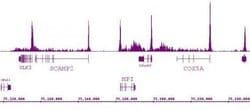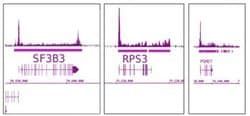RNA Pol II Recombinant Mouse Monoclonal Antibody, AbFlex™, Active Motif™
Manufacturer: Fischer Scientific
Select a Size
| Pack Size | SKU | Availability | Price |
|---|---|---|---|
| Each of 1 | 50-199-3719-Each-of-1 | In Stock | ₹ 41,118.00 |
50-199-3719 - Each of 1
In Stock
Quantity
1
Base Price: ₹ 41,118.00
GST (18%): ₹ 7,401.24
Total Price: ₹ 48,519.24
Antigen
RNA Pol II
Classification
Monoclonal
Conjugate
Unconjugated
Gene
POLR2A
Gene Alias
220kDa; BOS_18773; DNA-directed RNA polymerase II largest subunit, RNA polymerase II 220 kd subunit; DNA-directed RNA polymerase II subunit A; DNA-directed RNA polymerase II subunit RPB1; DNA-directed RNA polymerase III largest subunit; EC 2.7.7.6; hRPB220; hsRPB1; MGC75453; Pol II S2p; POLR2; POLR2A; POLRA; Polymerase (RNA II (DNA directed), large polypeptide; polymerase (RNA) II (DNA directed) polypeptide A; polymerase (RNA) II (DNA directed) polypeptide A (220kD); polymerase (RNA) II (DNA directed) polypeptide A, 220kDa; polymerase (RNA) II subunit A; POLYMERASE II; RNA; RNA POL2; RNA polymerase II 1; RNA polymerase II subunit A; RNA polymerase II subunit B1; RNA-directed RNA polymerase II subunit RPB1; RP02; Rpb1; RPB220; RPBh1; Rpii215; RpIILS; RPO2; RPO21; Rpo2-1; RPOL2; SUA8
Host Species
Mouse
Purification Method
Protein A
Regulatory Status
RUO
Gene ID (Entrez)
5430
Content And Storage
-20°C, Avoid Freeze/Thaw Cycles
Form
Liquid
Applications
ChIP sequencing (ChIP-seq), Immunocytochemistry, Immunofluorescence, Western Blot
Concentration
1 mg/mL
Formulation
140mM HEPES, 35mM sodium acetate with 30% glycerol, 70mM NaCl and 0.035% sodium azide; pH 7.5
Gene Accession No.
P24928
Gene Symbols
POLR2A
Immunogen
This RNA Pol II antibody was raised against a synthetic peptide YSPTSpPS corresponding to human RNA pol II. It recognizes both the phosphorylated and unphosphorylated forms of the largest subunit of RNA pol II.
Quantity
100 μg
Primary or Secondary
Primary
Target Species
Human
Product Type
Antibody
Isotype
IgG2a
Description
- DNA-directed RNA polymerase II subunit RPB1 (POLR1A) is a DNA-dependent RNA polymerase that catalyzes the transcription of DNA into RNA using the four ribonucleoside triphosphates as substrates
- POLR1A is the largest subunit and is a catalytic component of RNA polymerase II which synthesizes mRNA precurors and many functional non-coding RNAs
- It also forms the polymerase active center together with the second largest subunit
- Pol II is the central component of the basal RNA polymerase II transcription machinery
- It is composed of mobile elements that move relative to each other
- RPB1 is part of the core element with the central large cleft, the clamp element that moves to open and close the cleft, and the jaws that are though to grab the incoming DNA template
- At the start of transcription, a single-stranded DNA template strand of the promoter is positioned within the central active site cleft of Pol II
- A bridging helix emanates from RPB1 and crosses the cleft near the catalytic stie and is through to promote translocation of Pol II by acting as a ratchet that moves the RNA-DNA hybrid through the active site by switching from straight to bent conformations at each step of nucleotide addition
- During transcription elongation, Pol II moves on the template as the transcript elongates
- Elongation is influenced by the phosphorylation status of the C-terminal domain (CTD) of Pol II's largest subunit (RPB1), which serves as a platform for assembly of factors that regulate transcription initiation, elongation, termination, and mRNA processing
- Regulation of gene expression levels depends on the balance between methylation and acetylation levelts of the CTD-lysines.





